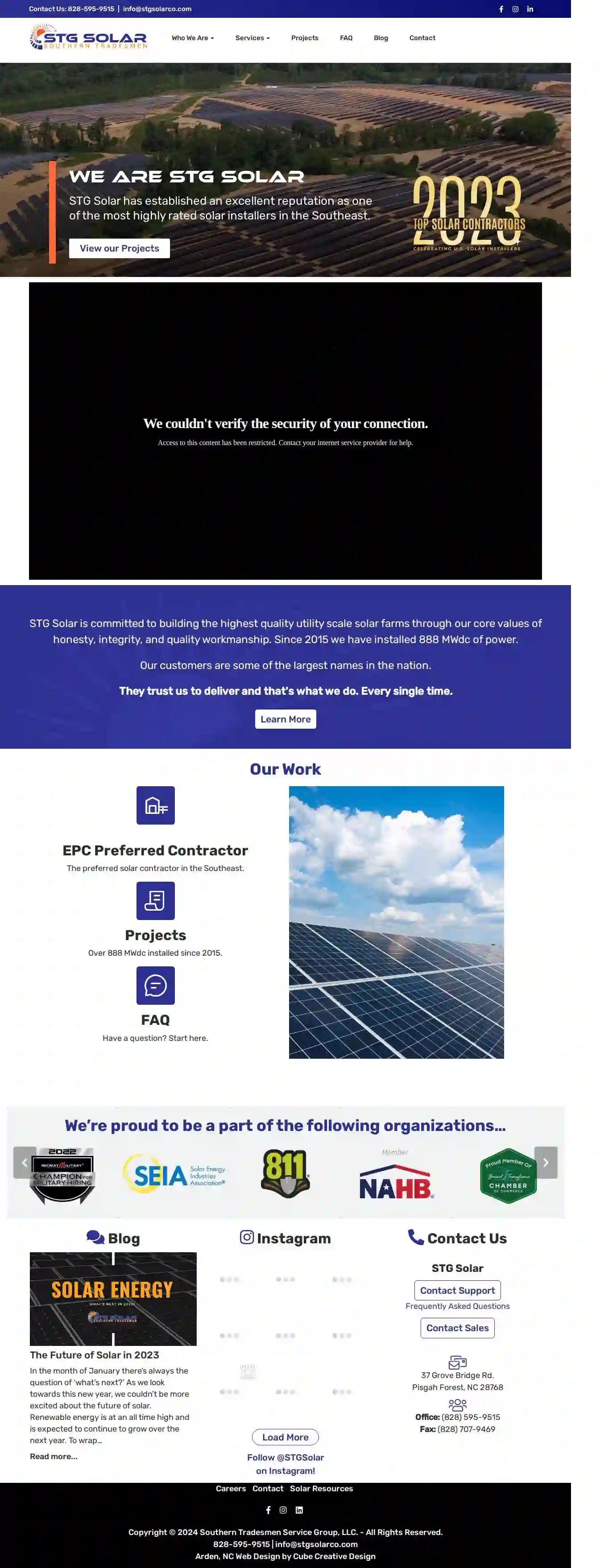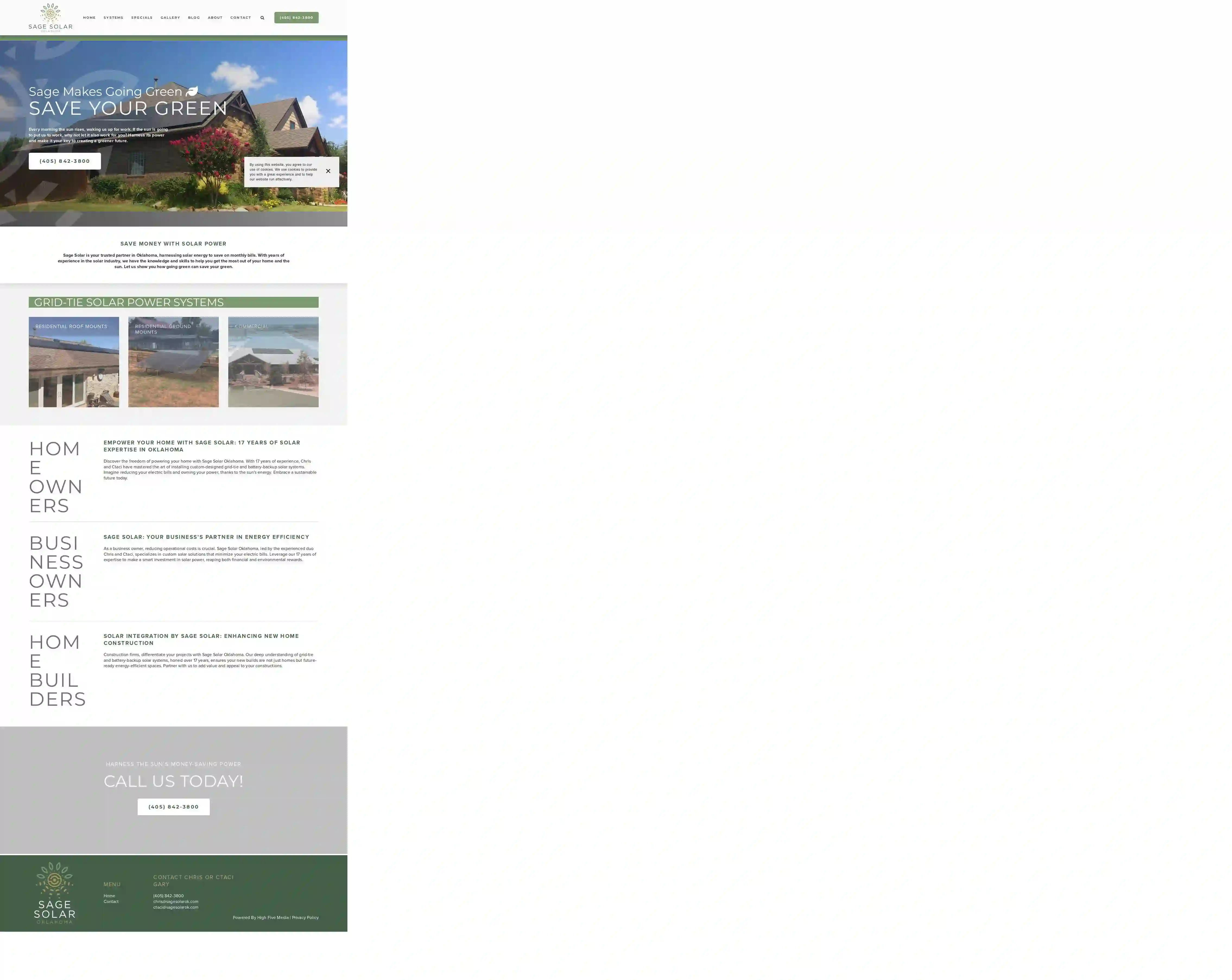Solar Installers Fayetteville
Find top Solar Panels For Homes in Fayetteville
Receive up to 3 Solar Panel Installation Near Me quotes for your project today! Compare profiles, reviews, accreditations, portfolio, etc... and choose the best service.

STG Solar
4.715 reviews37 Grove Bridge Rd, Pisgah Forest, NC 28768, 28768, USSTG Solar has established an excellent reputation as one of the most highly rated solar installers in the Southeast. STG Solar is committed to building the highest quality utility scale solar farms through our core values of honesty, integrity, and quality workmanship. Since 2015 we have installed 888 MWdc of power.
- Services
- Why Us?
- Accreditations
- Our Team
- Testimonials
- Gallery
Get Quote
Okie Solar
5149 reviews2616 South Ann Arbor Avenue, Oklahoma City, OK 73128, 73128, USOkie Solar is a locally owned and operated solar company based in Oklahoma City, originally founded in Yukon, Oklahoma in 2016. The company has helped thousands of home and business owners become energy independent. Okie Solar is dedicated to providing the best solar installation services to its customers, focusing on quality workmanship and customer service.
- Services
- Why Us?
- Accreditations
- Our Team
- Testimonials
- Gallery
Get Quote
Momentum Solar - Jacksonville
3120 reviewsSouth Plainfield, NJ, 3096 Hamilton Blvd, Building B, 07080, USMomentum Solar is a trusted solar installer in the US, providing quality solar panels and home solar systems with battery backups to lower energy bills and produce your own energy. They offer solar financing plans and government rebates that benefit homeowners across the US.
- Services
- Why Us?
- Accreditations
- Our Team
- Testimonials
- Gallery
Get Quote
Small Town Solar
4.450 reviewsN/A, USSmall Town Solar is a family-owned solar energy company dedicated to making a huge impact on employees' and clients' lives. They believe in building something meaningful where they give back to each small town they install in. Their mission is to provide cheaper and more predictable solar energy solutions, allowing clients to become completely independent from the grid.
- Services
- Why Us?
- Accreditations
- Our Team
- Testimonials
- Gallery
Get Quote
National Renewable Energy Corporation (NARENCO)
48 reviewsSuite A, 801 Wood Ridge Center Drive, Charlotte, 28217, USNARENCO is a leading solar company focused on developing, building, and operating utility-scale solar installations. Founded in 2009, the company has successfully partnered with leading investors and clients on groundbreaking projects. NARENCO's mission is to create long-term partnerships based on integrity, credibility, and reliability. The company's vertical integration ensures seamless management through every stage of the project lifecycle, from design to construction to operations and maintenance. NARENCO consistently delivers high-quality solar installations that revolutionize the energy market.
- Services
- Why Us?
- Accreditations
- Gallery
Get Quote
Central Solar
1234 Main Street, Wichita, KS, 73125, USCentral Solar is a turn-key solar solution provider, handling all aspects of your project from the initial consultation. They are the most trusted solar installer in Kansas, offering services for homes, businesses, and farms. Their recent installs showcase their expertise in solar solutions.
- Services
- Why Us?
- Accreditations
- Gallery
Get Quote
Sage Solar Oklahoma
57 reviewsOklahoma City, OK, 1234 Solar Way, 73120, USSage Solar is a locally-owned Oklahoma company dedicated to empowering Oklahomans with renewable and sustainable energy solutions. With a vision to make solar power accessible and beneficial for everyone in the state, the company has been transforming lives through solar energy for over 17 years. Their team of dedicated professionals is committed to providing custom-designed, high-quality solar power systems that offer energy independence, lower electricity bills, and contribute to a cleaner and greener environment.
- Services
- Why Us?
- Accreditations
- Our Team
- Testimonials
- Gallery
Get Quote
First United Solar
56 reviewsFirst United Solar, Oklahoma City, OK, 123 Main St, 73101, USFirst United Solar is a company that takes great pride in being able to deliver the best solar energy solutions to commercial and residential clients in Oklahoma and Texas. Our solar expert installers are knowledgeable, experienced, and skilled in all concepts of solar installation services. We are passionate about products people can count on, for years to come and in any climate. That’s why we put quality at the forefront in every step of our design and installation process. With Enphase, we are assured that our customers are receiving industry-leading quality and performance. We offer residential solar financing options, low maintenance, tax incentives, and benefits for both residential and commercial properties. Our goal is to provide smarter energy solutions for your home.
- Services
- Why Us?
- Accreditations
- Our Team
- Testimonials
- Gallery
Get Quote
1st Solar
519 reviews123 Solar Way, Suite 100, Charlotte, 28205, US1st Solar is a leading solar energy company dedicated to providing sustainable energy solutions. With a mission to empower individuals, businesses, and communities to embrace renewable energy, they offer a range of services including solar system installation, ground-mounted systems, system maintenance, and more. Their team of seasoned professionals is committed to delivering top-notch service and results, making them a premier destination for all solar energy needs.
- Services
- Why Us?
- Accreditations
- Our Team
- Testimonials
- Gallery
Get Quote
Artic Solar, Inc. - Industrial Solar Thermal Solutions
1057 Ellis Rd N #17, Jacksonville, 32254, USArtic Solar, Inc. is a certified Veteran-Owned Small Business capable of providing Solar Energy Solutions. They specialize in advanced solar thermal technology, offering temperatures up to 400°F with no moving parts. Their technology is designed to inject heat into existing systems, eliminating the need for costly tracking systems and reducing O&M costs. Artic Solar serves various industries including mining, government, hospitals, and more, providing solutions for process heat, air conditioning, refrigeration, dehumidification, and electric power generation.
- Services
- Why Us?
- Accreditations
- Gallery
Get Quote
Over 4,210+ Solar Installers in our network
Our solar providers operate in Fayetteville & beyond!
SolarCompaniesHub has curated and vetted the Best Solar Contractors near Fayetteville. Find the most reliable contractor today.
Frequently Asked Questions About Solar Installers
- Monocrystalline: Made from a single silicon crystal, known for high efficiency (typically 18-22%) and sleek black appearance.
- Polycrystalline: Made from multiple silicon crystals, slightly less efficient (15-17%) but often more affordable than monocrystalline.
- Thin-film: Made from thin layers of photovoltaic material, lower efficiency (8-12%) but can be flexible and lightweight.
What are the different types of solar panels?
How do solar panels work?
What happens to my solar panels during a power outage?
Do solar panels increase my home value?
What are the different types of solar panels?
- Monocrystalline: Made from a single silicon crystal, known for high efficiency (typically 18-22%) and sleek black appearance.
- Polycrystalline: Made from multiple silicon crystals, slightly less efficient (15-17%) but often more affordable than monocrystalline.
- Thin-film: Made from thin layers of photovoltaic material, lower efficiency (8-12%) but can be flexible and lightweight.